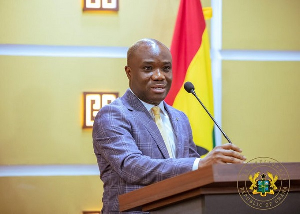First Lady Mrs Rebecca Akufo-Addo on Friday opened the 2nd African Girls Summit on Ending Child Marriage in Africa with a call on her counterparts to intensify efforts at ending child marriage on the Continent.
“We need to continue to intensify the fight across the continent, until a light is lit so brightly that none can put it out” Mrs Akufo-Addo told the over 500 delegates attending the summit.
The two-day summit is being convened at the instance of the African Union Commission (AUC), in collaboration with the Organisation of African First Ladies Against HIV/AIDS (OAFLA), UNICEF, and Plan International Ghana, to discuss and share experiences and best practices as well as highlight significant problems affecting the girl-child in Africa.
The summit, which is also focussing on the discussion of the eradication of female genital mutilation, is being held under the theme: “Enough with the Silence”.
Other first ladies from Liberia, Niger and Sierra Leone and Gender Ministers, chiefs and queen mothers, girls’ right activists, as well as policy makers and high level expertise and technical advisors from, Mozambique, Sudan, Zambia and Zimbabwe are attending.
Mrs Akufo-Addo said the challenges that comes as a result of child marriages were big setbacks to societal growth and so there is the need for all including the young girls themselves to use their voices and their intellect and deliberate actions to effect the change that was needed.
She said challenges that come as a result of child marriage and female genital mutilation include higher mortality rate from complications of child birth and extremely high risk of developing obstetric fistula.
She told the young girls participating in the summit that: “The movement for change is also in your hands and in the hands of the men and women who stand with you. You are uniquely placed to use your voices, your intellect and deliberate actions to effect the change that we need.
“Let’s ensure that nowhere on this continent would a child be married off or a girl undergo female genital mutilation”.
The First Lady said the future of Africa was dependent on harnessing all human and natural resources for the good of the continent and that the empowerment of girls was one of the most important things to do, to promote and sustain a healthier and more prosperous society.
”As we empower girls, they become better positioned to contribute to national development. We enable them to raise the next generation of Africans, who will in turn become the change that Africa needs, to become a prosperous and secure continent”.
Mrs Akufo-Addo said in Ghana, the Office of the First Lady was currently working on a pilot project with the United Nations Population Fund (UNFPA) to ensure that young girls remain in school.
“The success of this project will not only ensure that girls obtain an education, but also reduce the incidence of teenage pregnancies and stop girls from marrying early.
“Much activism has been done. My generation will continue to voice out, to strategize and challenge traditions and the establishment for our girls. But let me remind the young generation. The baton is being passed to you. With you, surely Africa is rising. I hope we all echo this message to girls in our various countries” the First lady said.
Ms Cynthia Mamle Morrison, the Minister of Gender, Women and Social Protection, on her part, urged all stakeholders to work towards promoting gender equality and women empowerment as a sure way to accelerate development.
She said Africa could not continue to look on while grave injustices were meted out against girls with impunity under the cover of traditions and culture even though policies and laws have been enacted.
“We must unite to act now” she said.
Ms Morrison announced to the excitement of the delegates that Ghana has allocated three per cent of the Gender Ministry’s annual budget to support the implementation of the National Strategic framework to address child marriage, in addition to what the development partners were contributing as a way of translating commitments into actions.
Madam Amira El Fadil, Commissioner of Social Affairs, AUC, said currently over 27 countries in Africa still have laws that allow girls to marry below age 18, and urged those countries to review their policies and laws and allow the girls to stay in school for long.
General News of Friday, 23 November 2018
Source: ghananewsagency.org

















